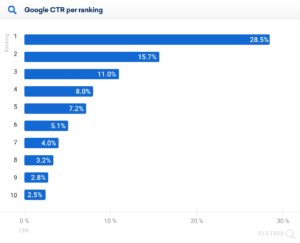4 Key Hotel Website SEO Factors Impacting Organic Bookings

The simple formula hospitality marketers should return to as they attempt to increase organic and direct bookings is drive traffic, increase engagement, increase reservations. The key to doing all of that organically? Search Engine Optimization.
Hotel SEO is one of the most critical tactics for hospitality marketers alongside metasearch and paid advertising. The first part of that important equation — driving traffic — comes down to where your hotel ranks on search engines. Are you on the first page when travelers go looking? Maintaining or improving your hotel’s page rank is all about these four important factors.
1. Technical SEO — It’s all about speed!
One common SEO mistake is putting too much stock into keywords and not watching out for the many other factors Google and other search engines use to generate Search Engine Results Pages (SERPs). Yes, keywords are critical to organic search, but so too is website performance.
Search engines use a range of tools that score your website based on a number of page experience and speed factors to determine where to ultimately rank your web pages. While there isn’t an exact public formula, there are tools that give you insight into your website’s performance and errors that could be dragging down your search engine page score.
Googlebot can pinpoint crawling errors
Google is constantly crawling the Internet (and your hotel website) to track updates to existing pages and find new ones. When the crawler finds a URL, it crawls the page and analyzes the text and non-text content and visual layout to determine where the page should be ranked in search results. You can use Googlebot yourself to uncover potential errors. Make sure your URLs are optimized for search engines, find broken links or 404 error pages and see if your page titles and meta descriptions are in place and optimized by running your hotel website through the bot in Google Search Console.
PageSpeed Insights uncovers technical issues
There have been two pivotal changes in the search industry in recent years. First, Google has shifted to mobile-first indexing, meaning the performance of your mobile website is now the baseline to determine search rankings, not desktop! Second, an update in summer 2021 is putting more emphasis on page experience. Using the PageSpeed Insights tool, you can get your hotel website’s overall speed score as well as other web performance metrics. It’ll also show specific errors impacting your scores.
Technical SEO is the most complex aspect of ranking on search engines, but it’s one of the most important and overlooked ones too. It’s important to utilize the tools available or talk with an SEO specialist to ensure your website is properly optimized.
2. Stay on top of your branded keywords
Brand recall is an important part of hospitality marketing. Think about how often travelers use the exact name of a hotel to find a place to stay. When someone searches for your hotel name, what do they see? Branded keywords are the easiest to rank for on SERPs, but it’s still important to make sure a search for your hotel yields positive results.
Staying on top of your hotel’s branded keywords is simple. Do various searches for your hotel brand (such as Marquette Hotel) and see if your website ranks No. 1. You can try the search in Incognito mode to exclude your current location. Is your website first or is it out-ranked by an Online Travel Agency (OTA)? If you’re running pay-per-click (PPC) ads for branded terms, you may see those in the first slot. You may also discover that other nearby hotels and competitors or OTAs are running ads for your branded keywords in an attempt to drive direct bookings to their website when a traveler is searching for yours.
Branded keywords tend to have higher clickthrough and conversion rates, so if your website isn’t at the top of the search results, optimize your homepage and other website pages for branded keyword terms in your page title, meta descriptions, headings and content.
3. Optimize for niche keywords and organic search
Once you’ve taken care of your hotel’s branded keywords, it’s time to focus on non-branded keywords, which are the bread and butter of organic search. When your hotel increases its rankings on Google and other search engines for non-branded and niche keywords, it increases visibility, which in turn leads to increased traffic and direct booking opportunities.
According to SISTRIX’s analysis of billions of search results, 28.5% of users click on the first organic search result on Google. As expected, those click-through rates drop with each link (second position was 15.7%, third position was 11% and 10th position was 2.5%).

When done well, organic search is one of the best conversion tactics for hotels and certainly the most cost-effective. Users from organic search tend to have higher intent because your keyword matched their query. How can you improve your organic keywords? First, you should develop a content strategy for your hotel website. Then, conduct keyword research to ensure you’re using the best primary and long-tail keywords in page titles, meta descriptions and content.
There are a number of tools to help you put together a keyword plan:
Google Keyword Planner
If you have a Google Ads Account (which is free to create), you can use Google Keyword Planner to get a sense of monthly search volume. Despite being an advertising tool, Keyword Planner can help you discover new keywords based on a URL, hotel or keyword list and see monthly search volumes and keyword difficulty. WordStream also offers a free keyword tool to uncover monthly search volume.
Google Trends
Google Trends doesn’t show specific search volume, but it can analyze keywords for current and historical popularity. This can help you make decisions on using one keyword versus another in your content.
AnswerThePublic
Ever wonder what questions people are asking on Google? AnswerThePublic has SEO and content marketing tools to help you with both keyword research as well as more specific questions people are asking. For example, ‘Hotels in Minneapolis’ results in dozens of related searches travelers perform such as ‘Hotels Minneapolis Park and Fly’ and ‘What Hotels in Minneapolis Allow Dogs.’
4. Don’t forget off-site SEO factors
While you’ll spend a lot of time on the technical side of your hotel website and building your keyword profile, there are several other SEO factors that aren’t directly tied to your website. It’s important not to forget about off-site factors that can impact SEO:
Backlinks
You can use this tool to see your Domain Authority, referring domains, backlinks and more. Backlinks, which are links from other websites, impact your domain authority, which is one metric used in deciding page rank. You’ll want to keep an eye on potentially toxic backlinks and work with an SEO specialist to disavow them.
Google My Business
When a traveler searches for your hotel, they are likely to see a knowledge panel with your Google My Business profile. Don’t forget to keep this optimized for SEO and use structured snippets on your website to include NAP details.
When done right, hotel SEO can have a measurable impact on your hotel website’s organic search placement, leading to increased traffic and direct bookings. See what we’ve discovered as the three most common SEO mistakes hotels make and let us know if you have questions about how your hotel website could improve its SEO.

